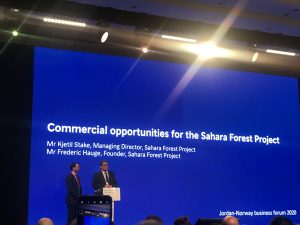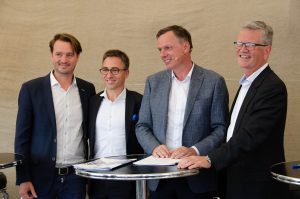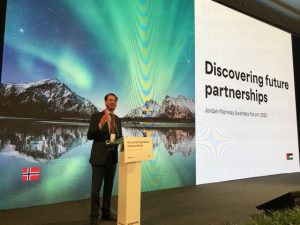Jordanian high-end vegetables sees new world markets
By:
Kjetil Stake, (Managing Director Sahara Forest Project)
Frederic Hauge, (Founder, Sahara Forest Project)
*A version of this op-ed was published in the Jordan Times paper edition on March 2nd.
Will Jordan’s water scarcity and vast desert lands be a barrier for high-end agricultural production for the future? With confidence we can say that it will not. Rather we see opportunites.
This week the Sahara Forest Project will launch a cooperation with Norwegian wholeseller BAMA to bring cherry tomatoes and sweet potatoes from Aqaba to Norway. International cruiseships from Costa and AIDA calling the port of Aqaba are committing to buy larger volumes and extend their agreements to the already existing supply. Utilizing unprecedented and innovative technological concept, we strive to be an inspiration for smart solutions to face desertification and food scarcity across the region.
SFP uses saltwater, sunlight and Jordanian arid land to produce top-notch vegetables. At the same time, we bring forward a solution to face desertification and food scarcity across the region whilst creating new high-skilled jobs for young Jordanians.
On Monday March 2nd, their Majesties King Harald and Queen Sonja of Norway started their official state visit to Jordan. This is the first official state visit from Norway to the Middle Eastern region, and the visit marks 50 years of diplomatic relations.
Mutual visits between Norway and Jordan has over the years have led to new innovation and business-oriented projects developing on the ground in Jordan. As a direct result of a visit by His Majesty King Abdullah II to Oslo in 2010, one such example uniting our two countries is the Sahara Forest Project (SFP).
We believe the agreements with Italian cruiseline Costa Crociere, German cruiseline AIDA and Norwegian wholeseller Bama is helping Jordan in positioning as a more attractive host for European-based projects seeking implementation in the MENA region.
Sahara Forest Project is a result of the work of 60 different experts from 12 different countries. Their mission has been to create a unique desert concept which is good for the environment, good for social development and good for business.
When it comes to environmental entrepreneurship in dry areas, we see an enormous global potential if Jordan, Norway and private partners can make the actions on the ground in Aqaba a success.
Last spring, Michael Thamm, the CEO of Costa Group met with us. As Jordan Times reported in August, a new agreement was signed to supply eight different ships from Costa and AIDA calling to Aqaba to serve Jordanian high-end vegetables produced with using desalinated saltwater in their restaurants. On March 2nd, Costa Group announces that they are committing to buy up to ten times more vegetables from us for ships calling to Aqaba in 2021.
This demonstrates an international demand for Jordanian products produced in a climate-smart way in the desert. On the day of the official state visit, the high-level Business Summit has already created a new partnership between Norway and Jordan. We are proud to welcome BAMA, Norway’s largest private distributor of fruit and vegetables to Jordan. Together, we will soon start not only bringing from Aqaba to Norway, but also cooperate on how to bring technological know-how and on the ground experiences from Aqaba to other foreign agricultural projects. BAMA will announce that they will look into replication of the concept in Jordan and bring ideas to other dry production areas, and where there are challenges when it comes to grow crops.
We are very grateful to a numerous of people in Jordan and Norway to make these developments possible. Jordanian and Norwegian decision makers have been very supporting for years. The support from the European Union was crucial in the implementation. Mr. Malek Kabariti deserves our sincere gratitude for his invaluable assistance and guidance over the years And finally: Warm and special thanks to our dedicated local staff on the ground in Aqaba. Shukran.



